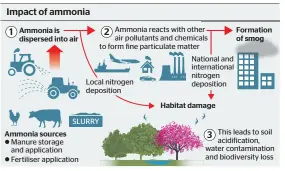- Location
- Forfar,Angus,Scotland
27n 10s £198
26n 35s £212
Both compounds April pay
26n 35s £212
Both compounds April pay
Any prices for 0 24 24 and 0 20 30 Devon?No, buying group was more expensive than the merchant this was purchased from.
Same as prices I had today.Prices I have been given:
CF 34.5%N 215 Nov
Single top 215 Nov
Double top 225 Nov
23,3,13,7s 247 Nov
Around £330DAP price anyone?
Earlier prices still cheaper than now, by about £10-15/tHad text from buying group to effect of lower prices on AN.
Didn't ask, should not be happy to have been forked two years running for buying early.
Not sure if this is being discussed elsewhere on the forum, haven’t been on much of late, but this is a DEFRA consultation about banning UREA due to its contribution of ammonia to the atmosphere. As there will be many urea users in this section, I’d recommend they respond to the consultation.
Reducing ammonia emissions from urea fertilisers - Defra - Citizen Space
This site contains consultations that are run by Defra.consult.defra.gov.uk
I just looked at it and came to the exact same conclusion!It's on my to do list.
I had a look last night, thought some of the questions to be loaded, meaning they point you towards the point of view they want to hear.
Agreed, a simple supportive yes and you tock a box, anything against requires an explanation.I just looked at it and came to the exact same conclusion!
I'll be writing responses in the boxes alongside don't know answers, I won't blindly tick the boxes they want ticking.I just looked at it and came to the exact same conclusion!
Oh my lord!!!! Really?Even 'The Times' is weighing in with a half baked 'opinion':
Farmers face ban on using fertiliser linked to pollution and habitat loss
- The Times
- 4 Nov 2020
- Ben Webster Environment Editor

Farmers face being banned from using a type of fertiliser that causes air pollution and threatens wild flowers.
The government estimates that banning solid urea fertiliser would prevent more than £1 billion of damage to health by 2030.
Up to half of the fertiliser evaporates, causing ammonia emissions that react with other pollutants to produce fine particles whose microscopic size allows them to penetrate the lungs and enter the bloodstream, making them the most dangerous form of air pollution.
The fertiliser also causes excess nitrogen in soil, which promotes the growth of brambles, nettles and hogweed. These crowd out wild flowers such as harebell and bird’s-foot trefoil.
A ban on the sale or use of solid urea fertiliser is the preferred option in a consultation started by the Department for Environment, Food and Rural Affairs (Defra). Other options include requiring a chemical to be added to the fertiliser to reduce the pollution it causes or limiting farmers to using it in winter when cool, wet conditions mean less evaporates.
The Clean Air for All Campaign by The Times is calling for all sources of air pollution to be addressed under a new Clean Air Act. Defra admitted yesterday that the government is set to miss its target of reducing ammonia emissions by 8 per cent on the 2005 level by the end of this year. Emissions of ammonia fell by 21 per cent between 1990 and 2013 but increased by 10 per cent up to 2017.
Defra expects farmers to switch to using more ammonium nitrate fertiliser, which is dearer but causes less to evaporate. A ban is expected to cost farmers £132 million up to 2030 and result in an extra 388,000 tonnes of ammonium nitrate being needed per year.
The National Farmers’ Union urged the government not to ban urea, which it said was “safer to handle [than ammonium nitrate] as well as helping to maintain a competitive fertiliser market in the UK”.
Ammonium nitrate can cause explosions if not stored safely, as happened in Beirut in August in a disaster that killed more than 200 people.
George Eustice, the environment secretary, said: “Ammonia emissions are causing harm to sensitive habitats. Any changes will need to be made in a way that is realistic and achievable for farmers, but which help us to achieve our targets for air quality.”
Simon Birkett, founder of the campaign group Clean Air in London, said: “More technical measures and lifestyle changes will be needed if we are to reduce ammonia emissions.”
Jenny Hawley, policy manager at the charity Plantlife, said: “Action from landowners, industry and government to [bring down] rising ammonia emissions is urgently needed.”